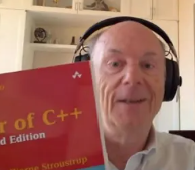Writing Functors with Boost.Lambda2 -- Richard Thomson
Utah C++ Programmers has released a new video:
Writing Functors with Boost.Lambda2
by Richard Thomson
From the video description:
Lots of standard algorithms require some sort of 'functor' or 'function object' in order to apply predicates and transforming functions to values. This makes the algorithms generic, but requires you to write your own function object classes or lambda functions, which can get a little noisy in the syntax.
Boost.Lambda2 is a library that allows you write lambda functions that look like simple expressions with placeholders for the arguments.
This month, Richard Thomson will give us a breakdown of the Lambda2 library in Boost that makes writing function objects simple and readable. We'll see how to use them with common standard algorithms before looking a little more deeply into how this library is implemented.

 A new instant classic for the new year, by the great Phil Nash of C++ on Sea...
A new instant classic for the new year, by the great Phil Nash of C++ on Sea... Hot off the video press:
Hot off the video press: ABSA == Ask Bjarne Stroustrup Anything:
ABSA == Ask Bjarne Stroustrup Anything: